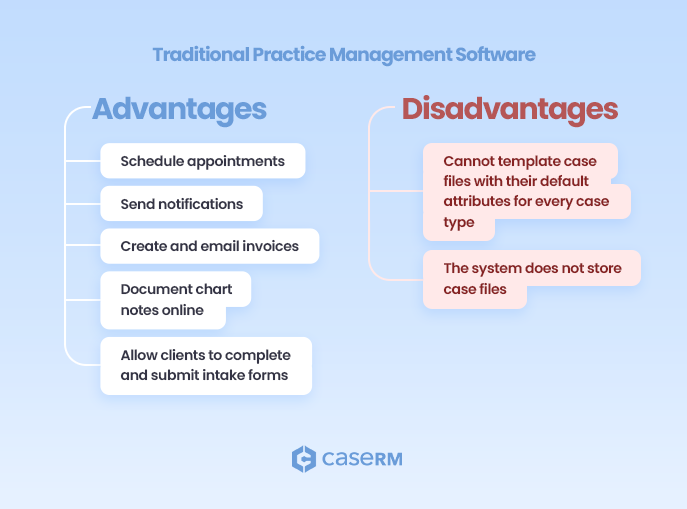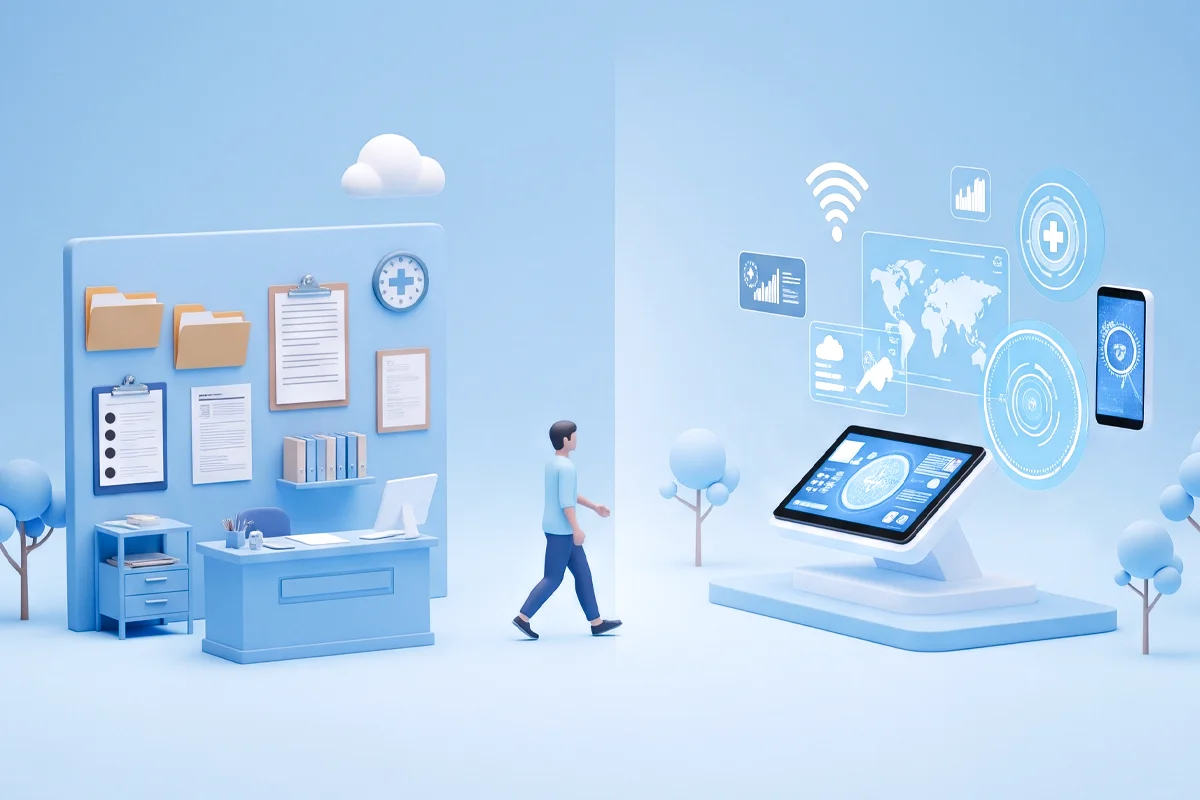In today’s rapidly evolving healthcare landscape, clinics face the difficult task of balancing traditional health practices with the need for modern, technology-driven solutions. Patients expect personalized care, seamless digital interactions, and coordinated treatment plans. Unfortunately, most practice management software is outdated – great at scheduling and billing, but terrible at handling the complexities of case files.
This is where Adaptive Case Management (ACM) comes in. ACM provides a case-centric, flexible framework that allows healthcare providers to integrate traditional care models with modern digital tools. The result? Better patient outcomes, improved collaboration, and streamlined operations.
Contents
Why Traditional Practice Management Software Falls Short
Enter Adaptive Case Management
Comparing Traditional Practice Management vs. ACM
Key Benefits of Adaptive Case Management for Clinics
The Future of Healthcare: AI + Adaptive Case Management
Real-World Impact of ACM
Adaptive Case Management Is Here to Stay
Why Traditional Practice Management Software Falls Short
Most traditional healthcare management systems offer a basic package:
- Appointment scheduling
- Notifications and reminders
- Online charting and note-taking
- Invoicing and intake forms
Sounds solid – but here’s the problem: these systems are patient-centric, not case-centric. They store data under a patient record, not a case file. That might not seem like a big deal until you need to open multiple cases for one patient (for example, a new injury, treatment plan, or legal matter).
Without case files, clinics lose context, workflows become rigid, and collaboration suffers. In short, traditional practice management software is too rigid for the adaptive healthcare environment we live in today.
Enter Adaptive Case Management
Adaptive Case Management software shifts the focus from patients alone to case files, the true core of healthcare operations. Each case file stores all documents, invoices, treatment plans, records, and notes – making it the single source of truth.
With ACM, clinics can:
- Open new case files for existing patients without duplicating records
- Collaborate seamlessly with internal staff and external stakeholders (referrals, case managers, legal teams)
- Adapt workflows dynamically instead of relying on rigid templates
This connected and integrated care means fewer errors, faster diagnoses, and more tailored treatments. Ultimately, ACM leads to better patient outcomes while cutting administrative waste.
Comparing Traditional Practice Management vs. ACM
Here’s a simple way to look at it:
Traditional Practice Management Software
Good for scheduling and billing
Standardized workflows
No case file support
Rigid processes
Limited collaboration

Adaptive Case Management Software
Case-centric, not just patient-centric
Flexible workflows that adapt to real-world complexities
Seamless collaboration with all stakeholders
Integrated data for clinical and financial insights
Scalable for modern, AI-driven healthcare
The difference is clear: ACM is the future of clinic management.
Key Benefits of Adaptive Case Management for Clinics
Healthcare providers adopting ACM see tangible improvements across the board:
1. Maximize Administrative Efficiency
By centralizing records and automating tasks, ACM frees staff to focus on patient care, marketing, and growth.
2. Boost Patient Satisfaction and Retention
Patients receive consistent communication, faster responses, and personalized care – all of which improve loyalty.
3. Enhance Workflow Flexibility
Modify workflows on the fly as cases evolve. From scheduling to billing, ACM adapts to real-world needs.
4. Optimize Scheduling and Resource Management
Manage rooms, providers, and equipment effortlessly while minimizing conflicts.
5. Improve Team Collaboration and Data Collection
Staff and external partners can securely share insights, reducing errors and enhancing treatment planning.
6. Economize Time and Increase Profits
Streamlined processes save hours each week, translating directly into higher profitability.
7. Elevate Brand Recognition Through Integrated Marketing
Modern ACM systems integrate with digital marketing tools, helping clinics attract and retain patients.
The Future of Healthcare: AI + Adaptive Case Management
The next evolution of ACM is its integration with artificial intelligence (AI). Machine learning enhances case management by:
- Automating chart note dictation
- Suggesting possible diagnoses or treatments
- Generating invoices and correspondence
- Providing predictive analytics for proactive care

By combining AI with ACM, clinics can reduce human error, improve efficiency, and deliver truly personalized care.
Real-World Impact of ACM
Research has shown that ACM adoption is borderless. Hospitals in Barcelona, Lleida, Groningen, and Tel Aviv already use adaptive case management to streamline care. Clinics worldwide are starting to see the benefits:
- For clinics: Less paperwork, faster adaptations, better organization.
- For providers: Easier collaboration and access to critical information.
- For patients: Quicker access to care, better communication, and stronger relationships with their providers.
Adaptive Case Management Is Here to Stay
The healthcare industry is moving away from rigid, outdated systems. Adaptive Case Management provides a holistic, case-centric approach that empowers clinics to do more with less effort. By enabling collaboration, flexibility, and AI-driven insights, ACM bridges the gap between traditional healthcare methods and modern digital innovation.
If you want your clinic to remain competitive, efficient, and patient-focused, now is the time to embrace ACM. The sooner you adopt it, the sooner you’ll see the benefits – in both patient outcomes and business growth.


